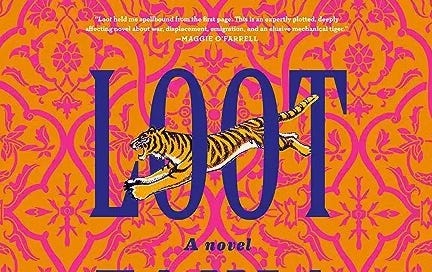BookLife Review: Loot, by Tania James
historical novel, India, British colonialism, plunder, automation, wood carving, toy making, 1790 to 1840s
Tania’s James’ Loot is a story of British colonialism in India beginning in the 1790s. In this tale, Abbas is a 17-year old wood carver and toy maker enlisted to join the artisans of the palace of Tipu Sultan to create an massive automated carving under the tutelage of the Sultan’s renowned French clock maker, Lucien du Leze. Abbas and du Leze are fictional characters, but the automated carving they create is real, created to commemorate an India victory over British soldiers.
The story spans 50 years, and traces Abbas’ coming of age. He learns volumes of information about automation, mechanics and engineering at the hands of du Leze. When du Leze eventually departs for his homeland, Abbas is caught in the seige of the palace and the downfall of Tipu Sultan. He flees to France and encounters a young woman he first met in India and who was later orphaned and adopted by du Leze. Together they conspire to reclaim the automated tiger sculpture from an English estate where it is on display in a collection borne of English plunder of Indian treasures.
The tale suffers a bit in places. There are gaps that are left unexplained and other segments that appear and then disappear. Characters at the forefront of the story go missing for chapters (or decades at a time only to reappear after extensive gaps. Minor characters at the front of the story take center stage later, for reasons that remain unclear. Rum, a servant to the Sultan, later appears in service to (and the love interest of) the widow of a British soldier; he then commands center stage of a significant remainder of the story. Similarly, midway through the story, Abbas travels by boat and experiences an intense interaction with two brothers, one of whom befriends him, and that shipboard experiences evaporates without apparent later impact in the arc of the story, like an amputated middle joint.
Despite those idiosyncratic storytelling choices, Loot is a window into British colonialism and plunder. That is not a new vein mined here, however, and perhaps what resonates and remains most vividly is the glimpse into the history of automation and the contribution of the earliest craftsmen and artisans in the field.




